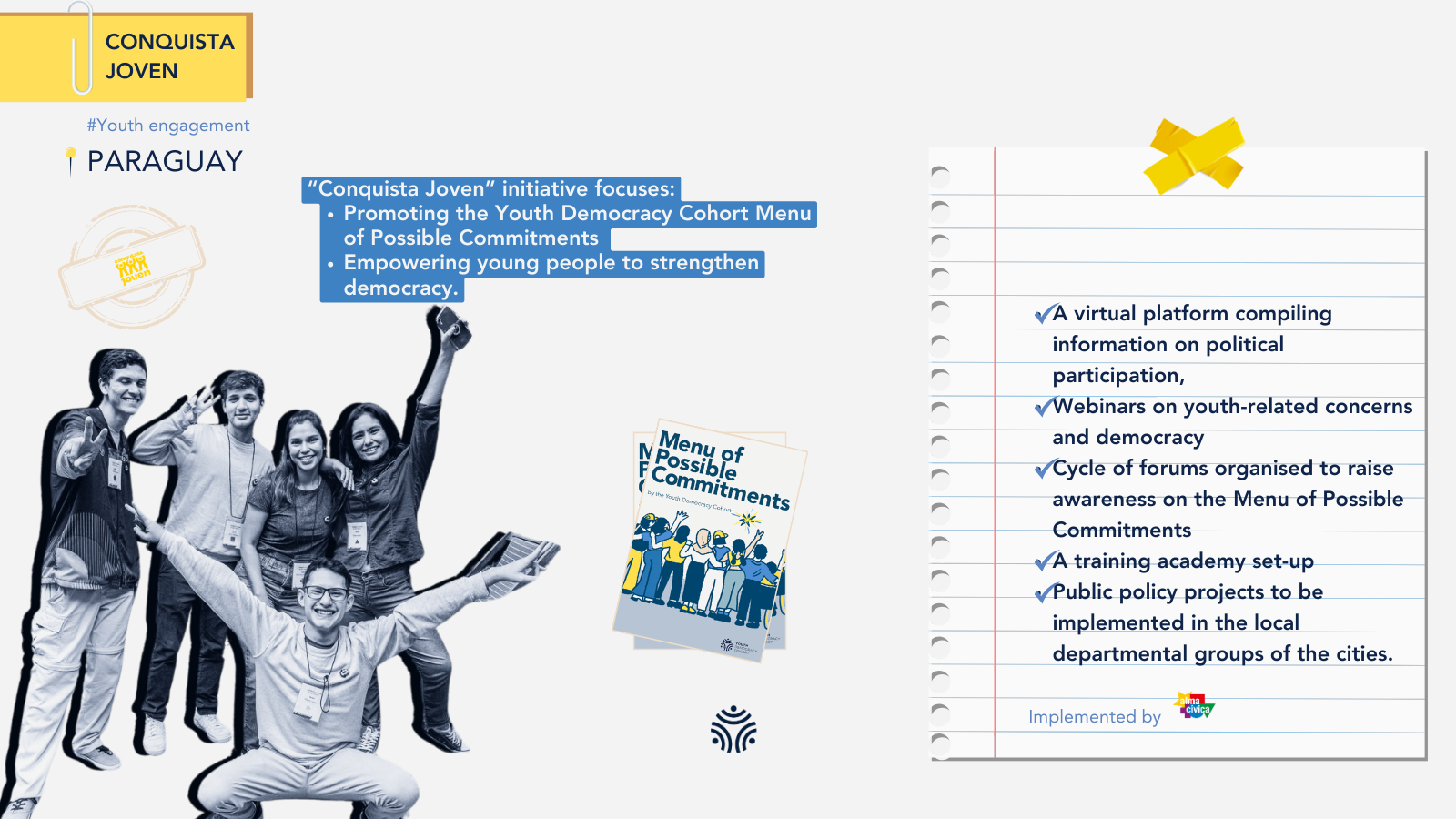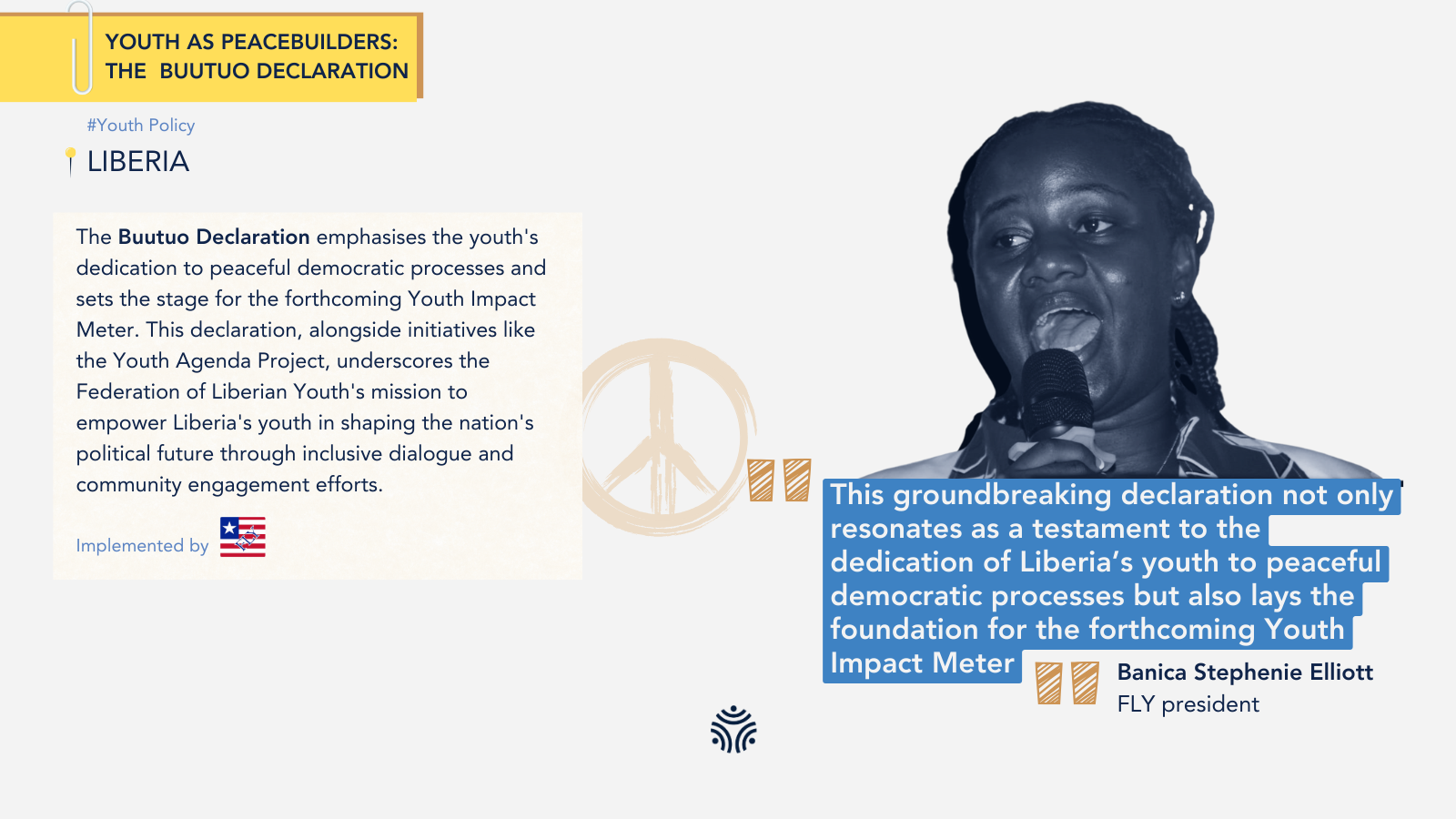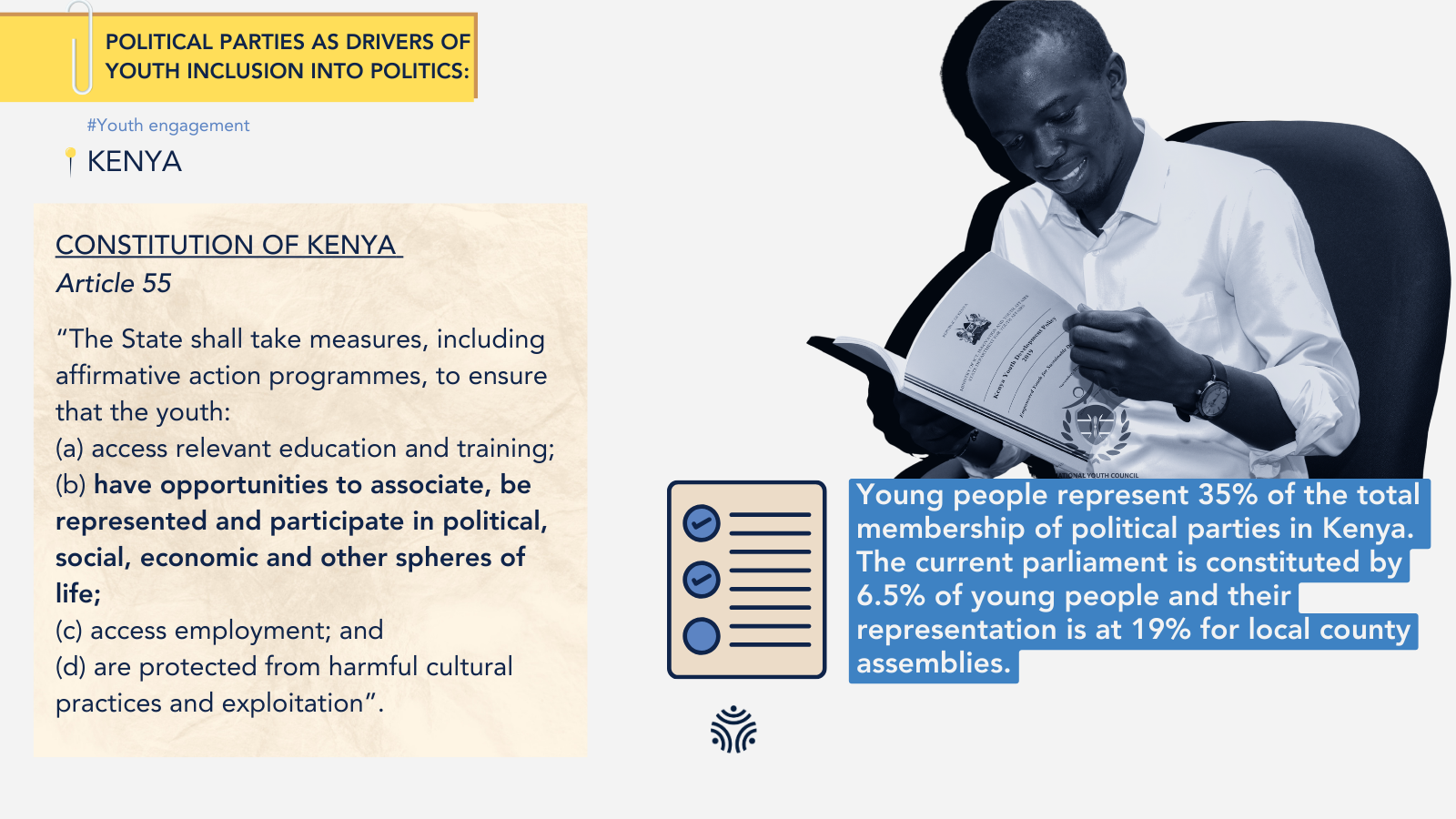
Ahead of the third edition of the Summit for Democracy, the Youth Democracy Cohort (YDC) relaunches the Menu of Possible Commitments to garner momentum for greater improvement of youth political participation rights. In the next weeks, join us in celebrating how youth-led initiatives can benefit our democracies as we bring commitments to life through a series of articles and social media posts.

About the Author
Santiago is a Policy Officer at EPD – European Partnership for Democracy. He is responsible for coordinating the Youth Democracy Cohort and driving our engagement at the Summit for Democracy.
Santiago joined the EPD in June 2023 and is originally from Paraguay, although he has been living in Europe for the past seven years. He has previous experience in the NGO, international organisations and private sector.
Beyond the troubles of incorporating the youth’s voice in decision-making, young people face complex obstacles when attempting to formally enter politics. The costs and benefits calculations often lead young people to abandon their plans to become candidates or venture into a civil service career. In contrast to the first category, the second category of the Menu focuses on increasing the number and impact of young people in government.
Our own research estimates that only 10% of members of parliament (and equivalent lawmakers) worldwide are aged 35 years old or younger, while the Inter-Parliamentary Union estimates that only 2.8% of lawmakers are 30 years old or younger. Yet, young people remain engaged in public affairs, through protest movements and social media. They are not less inclined to run for office but face increasingly big hurdles to do so.
Overcoming Obstacles: The Challenges of Youth Political Engagement
There are several policy reforms that require little political manoeuvring to be implemented, but more efforts are required to ensure these reforms are not tokenistic. Youth quotas for candidate lists, for instance, help in guaranteeing that political parties remain inclusive of the younger demographic. However, in certain political systems, young people are often placed too low on nomination lists. Meanwhile, quotas implemented in legislative bodies suffer from other fallacies. The much-celebrated youth quota in Morocco doubled the presence of young lawmakers but was criticised for its high level of political nepotism.
Lowering the age to run for office is another potential strategy. Last week, we mentioned how Nigeria recently amended its constitution to reduce the age to run for President from 40 years old to 30 years old and from 30 to 25 to run for the two legislative chambers. Yet, while youth engagement in the final elections was significant, there were no noticeable improvements in youth representation among those elected.
Youth quotas and lowering the candidacy age can be successful in improving youth participation but only when accompanied by other measures to address structural barriers. Otherwise, youth inclusion policies will only serve to mirror existing inequalities and dynamics of the country’s political system.
The costs of a political career continue to be a significant barrier that disproportionately affect young people. High candidate fees or requirements, as well as campaigning costs are huge deterrents for youth from low- and middle-income backgrounds. The result is an unfair advantage for young people coming from families with political traditions and significant financial resources. For instance, improved financing schemes for young candidates could have tackled the nepotism problems around Morocco’s youth quotas.
Exploring Policy Reforms
Political parties are considered the first barrier hindering the engagement of young people. In fact, the decline in political parties’ membership is staggering and is mainly driven by difficulty in engaging the younger generation. The impact across the board for young people in politics is noticeable. The willingness of parties to nominate young candidates is considered the most important factor affecting youth representation in politics (see the work of Daniel Stockemer). In sum, if young people are absent at the political party level, they are absent in institutions.
The difficulties and challenges are magnified for marginalised groups. The costs of entering politics, for instance, are elevated for young women. Lowering the costs is not enough since young women may also struggle to find political and financial backing from peers and donors. Young women, young members of ethnic minorities, and young people with disabilities are also more likely to feel marginalised from traditional politics and are less inclined to join political parties that don’t represent them.
This deteriorating situation has a truly detrimental effect on our democracies. Having young people at the decision-making table not only symbolically improves the representativeness of politics. By providing fresh perspectives on modern-day issues, youth can provide innovative solutions and re-energise the civil service.
Our democracies and societies also suffer beyond the functioning of institutions. Much of the political disengagement of people can be attributed to the lack of representation and a broader disconnect with policymakers. The future stability of democracy relies on talented, enthusiastic, and passionate citizens in elected positions as well as the civil service.
Young people’s participation must be institutionalised for their potential to be truly harnessed. Political parties have an important role to play. They can, for instance, adopt internal strategies to engage young people and grant greater responsibility and participation for youth wings. Meanwhile, government institutions must make a concerted effort to define a legal framework that facilitates and protects the inclusion of young people in politics.
Success Stories on supporting youth in government
Commitment #10 – Alma Civica and building the capacity of young leaders
Supporting young candidates running for office (with particular attention to women, youth with disabilities, ethnic and minority youth, Indigenous youth), by providing capacity building, addressing age-related barriers, financial obstacles, and promoting behavioural changes in political parties and societies.
Menu of Possible Commitments

Over the last years, Alma Cívica has been supporting young people with political aspirations and politicians at the beginning of their careers in Paraguay through training and mentoring. Their School of Politics and Public Leadership is an initiative that nurtures political and community leadership for elected councillors, community leaders, and civil servants. In the last two years, five different academies have been established, reaching more than 60 cities.
In 2022, 38 young leaders were trained with the number rising to 74 in 2023. The training aimed to improve the theoretical, practical, and personal skills of participants as well as providing tools and methodologies to devise and implement public policy initiatives.
At the time of writing, 7 young alumni from the School were elected as city councillors after receiving training from Alma Civica. Young people often simply lack the tools rather than willingness to become engaged in politics. Training and mentorship opportunities can go a long way in improving the representation of young people at all levels of government.
Commitment #11 – Federation of Liberian Youth and the Buutuo Declaration
Bringing together youth representatives from all political parties to adopt a pact, a declaration of principles, or a code of conduct focused on rejecting disinformation and political violence ahead of elections.
Menu of Possible Commitments

The Federation of Liberian Youth (FLY), the umbrella body of youth organisations funded by the government, has made huge strides in ensuring that young people in Liberia commit to the principles of peace and tolerance. Ahead of the 2023 general election, FLY coordinated the signature of the so-called Buutuo Declaration, in which key youth stakeholders committed to observing order and peace throughout the entire electoral process. Representatives from the youth wings of the major political parties participated, as well as community-based organisations.
The document was signed in the town of Buutuo, in Nimba County, known as the place where the country’s devastating 14-year-long civil war started. International election observers noted the peaceful nature of the elections and commended civil society organisations for actively supporting a peaceful electoral process.
The work of FLY not only illustrates the impact that an independent and government-funded youth organisation can achieve but also shows how coordinated action between youth organisations can lead to significant impact that improves democracy. Young people can act as peacebuilders when allowed space.
Commitment #13 – Kenya’s Youth Quotas
Establishing youth quotas which promote inclusive youth engagement, rather than create competition among diverse populations of young people.
Menu of Possible Commitments

Kenya’s 2010 Constitution has successfully protected the place of young people in politics and aims to promote inclusive engagement, rather than creating unnecessary competition for young people. It established a legal framework and provided quotas for young people at the national and regional levels. Article 55 effectively demands the government to take measures to ensure that young people are capacitated and represented.
These specific measures include the provision of 12 parliamentary seats for representatives nominated by political parties to represent special interests, including youth and persons with disabilities. The drivers of youth inclusion are then political parties, thus clearing a major hurdle at the beginning of the journey for young candidates.
The impact? As of 2022, young people represent 35% of the total membership of political parties in Kenya, as they see value in entering mainstream politics. The current parliament is constituted by 6.5% of young people and their representation is at 19% for local county assemblies. Barriers remain but the legal framework in Kenya has created a solid foundation for young people to increasingly engage in politics, and there are appropriate measures ensuring diverse representation.
Join the campaign
These are only a handful of examples of the positive impact that greater youth input can have on democratic governance. Join the Youth Democracy Cohort in calling for youth to be heard at all levels of policy-making by sharing the commitment that resonates with the issues in your community and by showcasing your own success stories with the hashtag #YouthInAction.